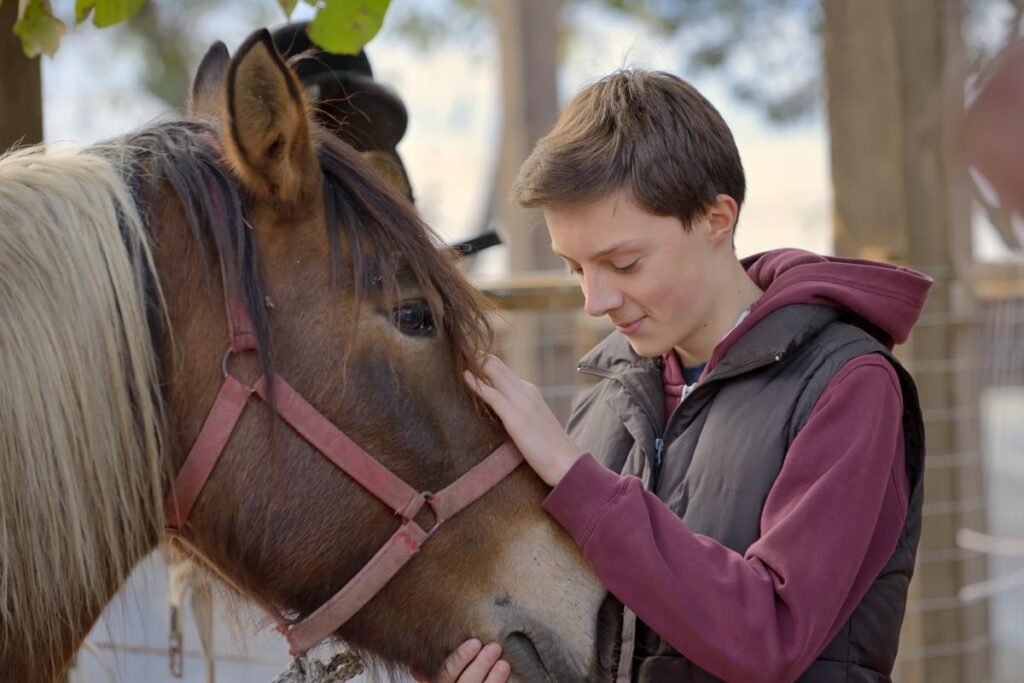Alternative and experiential treatments for health and well-being are increasingly popular, including among teenagers. Whether a teen is struggling with an eating disorder, substance abuse, social media, video games, or co-occurring disorders, alternative therapeutic approaches can help. Equine therapy and other modalities that help teens engage with animals and the natural world help teens gain perspective, develop coping strategies, and learn to care for themselves and others.
Are you looking for an alternative therapy for your teenager? Foothills at Red Oak Recovery can help. Our holistic treatment programs include equine and animal therapy for transformational healing. We treat adolescent men dealing with substance abuse and co-occurring disorders in beautiful North Carolina. Call us at 866.300.5275 to learn more.
What Is Equine Therapy?
Equine therapy supports holistic healing through horses. Many people experience comfort and calm when working with horses. Equine therapy begins with simple activities like feeding the horse and spending time getting to know them. This will progress to walking the horses around a round pen or arena. Over time, in individual or group therapy, people develop a deeper relationship with the horses and understand how this relationship offers give and take. Examples of activities include care and grooming for the horses, play activities, and – when appropriate – riding. Engaging with horses requires mindfulness, alertness, and attention to both yourself and the animal. During equine therapy, therapists assess how people and horses interact to help determine other modalities of treatment. For many, equine therapy is a profoundly healing modality that can build long-term relationships with the horses.
Benefits of Equine Therapy
Alternative holistic therapies can be especially effective with teens. Removing adolescents from school, home, and social stress allows them to connect more deeply with themselves and others. This connection often begins in nature. Horses and other large animals can help teens build empathy and self-compassion. Working with horses can also help teens build healthy boundaries and trust in relationships. Both caring for and riding horses can deepen the following:
- The ability to relate to others
- Sense of responsibility
- Focus and concentration
- Sense of calm
- Self-worth
- Understanding of emotions
- Compassion for self and others
Equine therapy can be even more effective when combined with other types of therapy. Tools developed in cognitive-behavioral, group, and family therapy can be implemented with horses for a safe, nonjudgmental experience. This can help teens integrating new strategies for coping and thriving at home and in school. Over time, equine therapy can make a vast difference for those struggling with substance abuse or co-occurring disorders.
Begin Teen Equine Therapy Today in Scenic North Carolina
Equine therapy is increasingly popular for teens. Spending time with horses and other large animals is rare in many communities. Focusing on the care and survival of a large animal can help struggling teens gain perspective and renew their sense of focus and self-care. At Foothills at Red Oak Recovery, we have both equine therapy and animal caretaking onsite.
Clients at Foothills have extended opportunities to interact with cattle and horses throughout the day without leaving the clinic. Animal care helps teens disengage from peer stress, social media, and other teenage problems to reassess what they want in life. Our holistic healing programs serve adolescent boys in our beautiful North Carolina facility. We focus on group, family, and individual therapies for substance abuse and co-occurring disorders. We believe in treating each client as a whole person rather than treating individual disorders or symptoms.
Learn More About Foothills at Red Oak Recovery
If your teen is struggling with addiction, mental health, social media, video games, or eating habits, call us today to get help. Learn about our holistic healing programs and equine therapy for young men at 866.300.5275.

